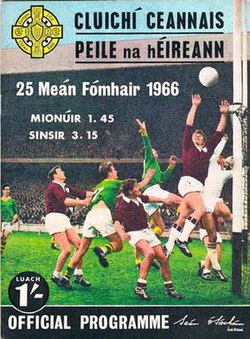Summary
This was to be, if not the battle of the century, at least the final of the decade. That was the assessment from all the pundits as Galway geared up to secure their third All-Ireland title in a row, against Meath. The credentials of both sides were perfect: Galway unbeaten since the 1963 All-Ireland SFC final with Dublin, against a Meath team that had put in an incredible second-half performance against Down to win by ten points. The champions, with the breeze behind them, made the early running. With 13 minutes gone they had strolled to a three-point lead. Despite the best efforts of the Meath side to keep the score that low against a Galway side who had the momentum, the crucial score came not long after. Cyril picked up possession and played the ball across the Meath goal. As it bounced across the face of Seán McCormack's goal, Mattie McDonagh came steaming in and planted the ball into the back of the net with relative ease. It was Galway's first goal in their "Three In A Row" assault. Thirty seconds later, Liam Sammon pointed, followed quickly by another from Séamus Leydon. This left it at 1–5 to no score in favour of Galway. Murty Sullivan got Meath off the mark but at half-time, they trailed by eight points, 1–6 to 0–1. A reshuffled Meath team re-opened the second half with promise, but the revival they sought, desperately needing a goal, never looked like coming. Meath outscored Galway in the second half but it was merely an irrelevant statistic as the Tribesmen had made it "Three In A Row", with a six-point victory. The ingredients were there for a thrilling contest were there for a thrilling contest, but on the day it all came apart for Meath and remained the same for a Galway side who made GAA history with their performance.
Mattie McDonagh scored a goal after 21 minutes and Galway led 1–6 to 0–1 at half-time, and went on to complete a three-in-a-row. McDonagh's goal came 11th in RTÉ's 2005 series Top 20 GAA Moments . [5]
